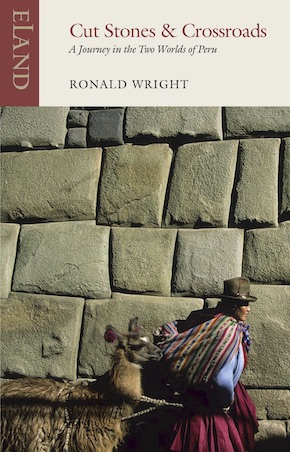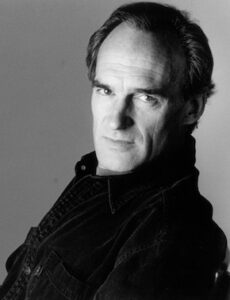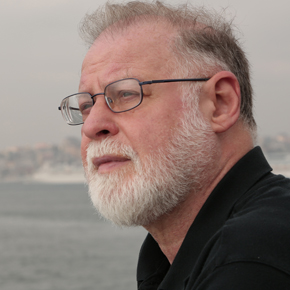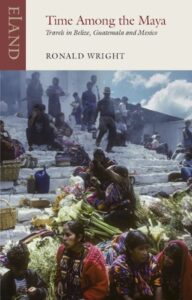Crossroads to the past
by Alberto Manguel
“The best modern travel book on Peru that I know.” John Hemming
“From time to time, God causes men to be born – and thou art one of them – who have a lust to go abroad at the risk of their lives and discover news – to-day it may be of far-off things, tomorrow of some hidden mountain.” Rudyard Kipling, Kim
The great twelfth-century traveller Ibn al-Arabi defined the very origin of our human existence as movement. “Immobility can have no part in it,” wrote Ibn al-Arabi, “for if existence were immobile it would return to its source, which is the Void. That is why the voyaging never stops, in this world or in the hereafter.” With a malicious linguistic twist, Ibn al-Arabi confuses our endless movement through time, from cradle to grave, with a pragmatic movement through space. Certainly, even cloistered in one’s room for the whole of one’s life, one is condemned to travel through the years, hour after hour, each one wounding us, as a sundial motto has it, until the last one kills us. And yet, an opponent of Ibn al-Arabi might have argued movement from one point of this earth to another is merely a succession of moments of being still: our geography exists only in the instant in which we are there, standing on our own two feet.
This notion of travel as moving through space, but also being in one place at a time, is vividly exemplified in the travel books of Ronald Wright, Cut Stones and Crossroads and Time Among the Maya, and in the history told in Stolen Continents. For several decades now, he has diligently chronicled the ancient civilisations of Latin America, travelling through Peru and Mexico, and rooting himself in a succession of historical moments, visiting not only the present landscapes but also those long vanished, like the courageous Time Traveller imagined by H.G. Wells. Wright witnesses the past from the vantage point of the present and reports back to us.
Because of this ability to see what once was in the context of what now remains, his books translate his observations into essays that artfully combine travelogues with archaeological research, and political science with anthropology. The strategies of political power in our time and the weight of a fading tradition, the social memory of past events and the construction of the idea of history, the confused or lost identity of a conquered people and the identities imposed by the conqueror – all these themes weave through Wright’s books forming complex and illuminating patterns that allow the reader to share and begin to understand the crossroads to the past.
Authenticity is the essential quality of all travel literature, imaginary or real. The vocabularies of the culture that formed us can distort or make us see a reality that is not that of the land extending before us.”
Wright’s writing is not limited to essays; he is also the author of remarkable works of fiction. Aware that, to a degree, the material evidence of his travels curtails the scope of an explorer’s curiosity, Wright decided, a few years after publishing his travel books, to expand his wanderings into the realm of the imaginary. The result was two splendid novels of adventure: first, the prescient and terrifying A Scientific Romance and then Henderson’s Spear with its parallel universes of sea travel and exploration. A Scientific Romance imagines a Britain turned tropical jungle in the climate changes of the not-too-distant future; Henderson’s Spear conjures up the tale of a South Sea voyage undertaken during the Victorian age. Both are also travel books, and the fact that they never took place in reality does not disqualify them from being authentic.
Authenticity is the essential quality of all travel literature, imaginary or real. The vocabularies of the culture that formed us can distort or make us see a reality that is not that of the land extending before us, unless we place ourselves not in the position of someone who knows the answers but someone who is interested in the questions.
Robert Frost’s dictum that “the land was ours before we were the land’s” is lethal to the observant traveller. Authenticity implies giving oneself over to the thing observed.
And yet, there is a paradox in the art of travel that seems impossible to overcome in order to achieve this required authenticity: that every discovery always entails some measure of recognition. Even as we set out, with unprejudiced eyes, to explore places where we have never been before, we are still incapable of seeing something entirely new if it were to appear suddenly before our eyes. We are all to a certain degree like Christopher Columbus who, during his third voyage to the New World, saw three manatees swimming near the mouth of the Orinoco River and jotted down in his journal, written in the third person, that “today the Admiral saw three mermaids.” (His honesty compelled him to add, “But they are not as beautiful as they are supposed to be.”) Fortunately, it is not how Ronald Wright has travelled.
When Cut Stones and Crossroads appeared in 1984, it was immediately hailed as a new kind of travel book, made up of personal anecdotes, erudite observations, fragments of conversations and historical notes. The subtitle, A Journey in the Two Worlds of Peru, prepares the reader for the observation of a schizophrenic culture, half steeped in its Inca past, half suffering from the onslaught of the world of our century. The guide on this journey is an affable, intelligent, humorous Canadian (Wright was born in England) with a profound feeling for the complexities of the land of Peru, an aesthetic and historical appreciation of the ancient culture of the Incas, and a deep respect for the survivors of what was once one of the greatest empires in the history of the world.
Wright’s generous, erudite mind illuminates the reader’s journey. The reader learns on one page that “missionary evangelism for its own sake was virtually unknown in pre-Conquest American religions,” and on another of the “Latin American belief in the power of architecture to create institutions.” One passage dwells on the fact (incomprehensible in capitalist societies) that “gold and silver had no monetary value to the Incas: they were substances of beauty and religious meaning, the ‘sweat of the sun’ and the ‘tears of the moon,’” another on the qualities of pisco and coca. And reflections like the following, this one on the Runasimi language of the native people of Peru, threatened with extinction, lend universal meaning and particular purpose to Wright’s story:
Languages describe the world; like art styles, they emphasise some facets of reality, ignore others, and create categories of their own for which there may be no ‘objective’ reason and no parallels in another tongue. Languages shape, and are shaped by culture as a whole. When people lose their language for another, ‘profound distortions’ may affect their vision of the world: as if Hieronymus Bosch were suddenly forced to paint in the style of John Constable.
“I want to know everything,” says a character toward the end of one of Wright’s novels, Henderson’s Spear. Conscious that such an ambition is beyond human scope, Wright has chosen to show the vast and complex history of Peru, from its origins to the present, through the scattered fragments observed by a contemporary pilgrim. Wright has an eye for the telling trifle, an ear for the revealing snippet, a taste for the quietly heroic and the little absurdities of life. Like his English masters in the travel-writing genre – Robert Byron, Freya Stark, Alexander William Kinglake – Wright is capable of bringing a certain quality of both measured guesswork and irrefutable logic to what he observes, never allowing his personal experience to colour the entire picture. He is present in his story, certainly, as the narrator and the observer, but he never imposes his vision on the landscape, never translates the things he sees into a vocabulary that was invented to name other things. When Wright sees manatees they remain manatees.
Travel literature, at its best, is selectively revealing. Wright knows that even when we are confronted by the full picture, the eye dwells on details.”
Gustave Flaubert thought travel writing, as a genre per se, to be impossible. “To eliminate all repetitions,” he wrote, “you would have had to refrain from telling what you saw.” Wright avoids the repetitions by judiciously choosing what to tell and leaving the vast rest of the experience to be surmised in brief asides to the reader. Many strangers are met but not all are summoned onto the page; not every ruin, every mountain path, every meal is accounted for. Travel literature, at its best, is selectively revealing. Wright knows that even when we are confronted by the full picture, the eye dwells on details.
Wright travelled through Peru from Lima to the ruins of Cusco and Machu Picchu, from Chiclayo and Cajamarca in the north to Lake Titicaca in the south. Running like a red thread through his narrative, alongside his observations as an archeologist with anthropological leanings, is the account of a people colonised, underprivileged, left on the margins of our century, but quietly strong and dignified and still proud of their ancient blood, and of the richer nations’ failure to protect them from further exploitation.
In a series of lectures published in 2004 under the title A Short History of Progress, Wright wrote this:
We are now at the stage… when we have the tools and the means to share resources, clean up pollution, dispense basic health care and birth control, set economic limits in line with natural ones. If we don’t do these things now, while we prosper, we will never be able to do them when times get hard. Our fate will twist out of our hands. And this new century will not grow very old before we enter an age of chaos and collapse that will dwarf all the dark ages in our past.
Now is our last chance to get the future right.
From the introduction to Cut Stones and Crossroads (Eland, £12.99)
 Ronald Wright is the author of ten books of fiction, history, essays and travel published in eighteen languages and more than forty countries. His first novel, A Scientific Romance, won the David Higham Prize for Fiction and was chosen as a book of the year by the Sunday Times and the New York Times. Wright’s CBC Massey Lectures, A Short History of Progress, won the Libris Award for Non-fiction Book of the Year and inspired Martin Scorsese’s 2011 documentary film Surviving Progress. His other bestsellers include Time Among the Maya and Stolen Continents, chosen as a book of the year by the Independent and The Sunday Times. His latest work is The Gold Eaters, a novel set during the Spanish invasion of the Inca Empire. Born in England to British and Canadian parents, he lives on Canada’s west coast. Cut Stones and Crossroads, with an introduction by Alberto Maguel, and Time Among the Maya, with an introduction by Pico Iyer, are out now in paperback from Eland, who publish a new edition of On Fiji Islands in October.
Ronald Wright is the author of ten books of fiction, history, essays and travel published in eighteen languages and more than forty countries. His first novel, A Scientific Romance, won the David Higham Prize for Fiction and was chosen as a book of the year by the Sunday Times and the New York Times. Wright’s CBC Massey Lectures, A Short History of Progress, won the Libris Award for Non-fiction Book of the Year and inspired Martin Scorsese’s 2011 documentary film Surviving Progress. His other bestsellers include Time Among the Maya and Stolen Continents, chosen as a book of the year by the Independent and The Sunday Times. His latest work is The Gold Eaters, a novel set during the Spanish invasion of the Inca Empire. Born in England to British and Canadian parents, he lives on Canada’s west coast. Cut Stones and Crossroads, with an introduction by Alberto Maguel, and Time Among the Maya, with an introduction by Pico Iyer, are out now in paperback from Eland, who publish a new edition of On Fiji Islands in October.
Read more
@ElandPublishing
Author portrait © Neil Graham
 Alberto Manguel is a writer, translator, editor and critic. Born in Buenos Aires, he has since lived in Israel, Argentina, Europe, the South Pacific, Canada and France, and is now based in New York. His many prizes and awards include a Guggenheim Fellowship and honorary doctorates from the universities of Liège, in Belgium, Anglia Ruskin in Cambridge, UK, and York and Ottawa in Canada. He is a Commandeur de l’Ordre des Arts et des Lettres (France). His latest book is Fabulous Monsters: Dracula, Alice, Superman and Other Literary Friends (Yale University Press, 2019).
Alberto Manguel is a writer, translator, editor and critic. Born in Buenos Aires, he has since lived in Israel, Argentina, Europe, the South Pacific, Canada and France, and is now based in New York. His many prizes and awards include a Guggenheim Fellowship and honorary doctorates from the universities of Liège, in Belgium, Anglia Ruskin in Cambridge, UK, and York and Ottawa in Canada. He is a Commandeur de l’Ordre des Arts et des Lettres (France). His latest book is Fabulous Monsters: Dracula, Alice, Superman and Other Literary Friends (Yale University Press, 2019).
manguel.com
Author portrait © Melik Külekci


